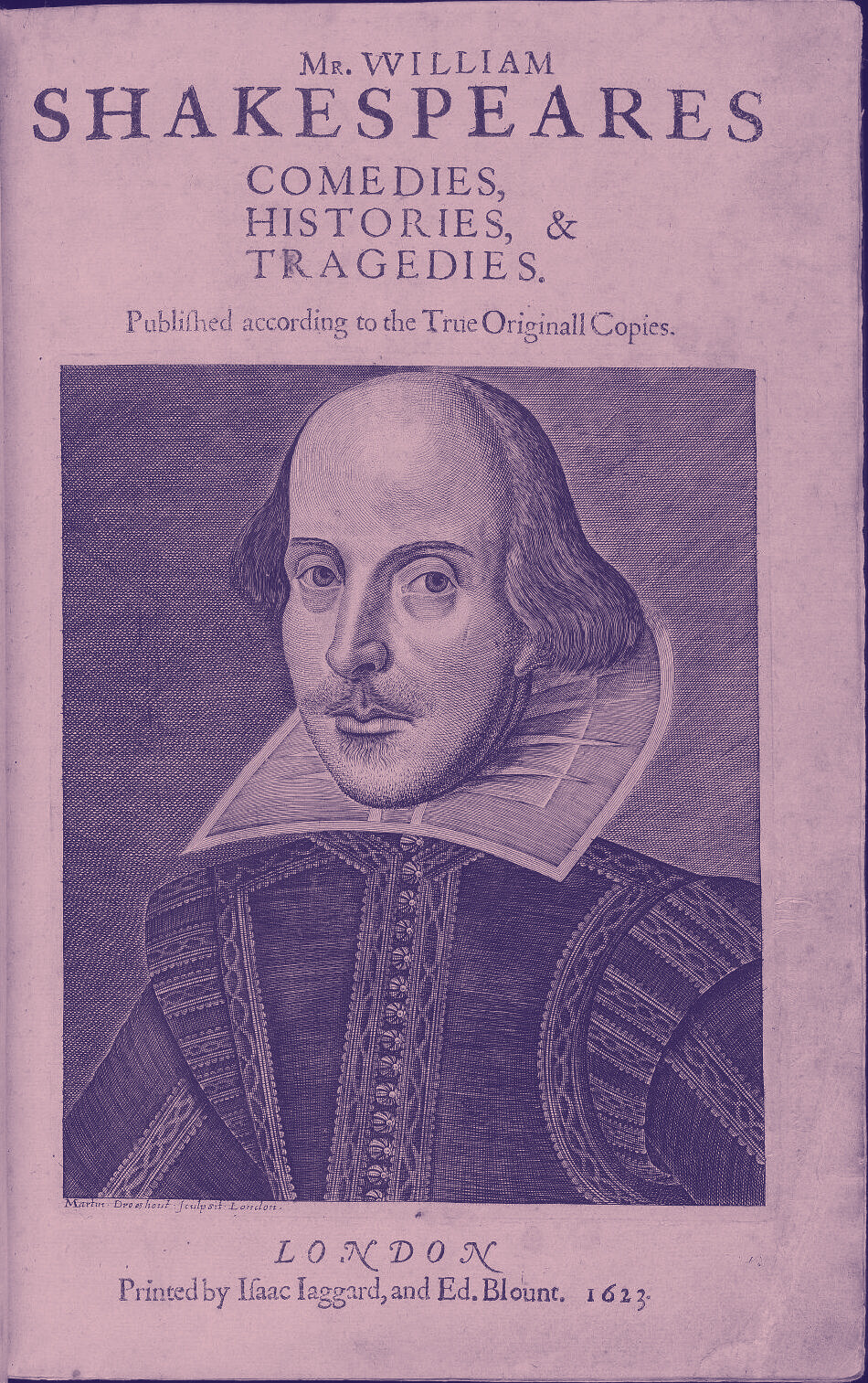

SEPTEMBER 5 - 7, 2024
SONG OF THE BARD

THE 2024 COLLABORATIVE WORKS FESTIVAL
IS PRESENTED IN PARTNERSHIP WITH

LAND ACKNOWLEDGEMENT
CAIC's performances and educational events take place on what is the traditional homeland of the Council of the Three Fires: the Odawa, Ojibwe, and Potawatomi nations. Other tribes, including the Miami, Menominee, Sac, Ho-Chunk, and Fox, also called what is now Chicago home.
Many indigenous people continue to call this area home, and Chicago continues to be home to one of the largest indigenous communities in the United States – a community which continues to celebrate their heritage, traditions, and stewardship of the land and waterways.
CAIC recognizes the history of the peoples of this land as well as the diverse indigenous community that resides here and enriches the community now.
Hello CAIC family!
Welcome to the 13th annual Collaborative Works Festival! Each year this Festival serves not only as the opening of our season but also an opportunity to showcase the beauty and intimacy of art song through an exquisitely curated set of concerts and world-class talent.
Last year’s Festival investigated a very complex space: ourselves. What does it mean to sing of one’s self in America today? Who am I at my core and am I bold enough to express that on stage and in the world at large? Our performers challenged us to examine our own personal narratives as we looked to a bright future ahead.
As I enter my second season as executive director of CAIC, I can confidently say that our future is bright and that is due to your unwavering support over more than a decade. And may I say, the next decade will be even greater!
During this year’s Festival, you are going to be immersed in the deep end of art song repertoire. You will leave singing beautiful songs from the 1600s played on period instruments like the lute, to modern tellings of Shakespeare’s tales. Song of the Bard illustrates that art song was the genre of then and is also the genre of now.
I must also take a few lines here to thank our steadfast board of directors and our immensely talented staff that are as motivated and committed as you to maintaining CAIC’s significant presence in the tapestry of our city.
We hope to see you at all our upcoming performances throughout the year, including an evening commemorating the centennial of Puccini’s passing in October, a dive into the French song repertoire in February, and a beautifully varied program of new gems and old classics in April.
CAIC is grateful to be a world-class home for the study and performance of art song, both for the astonishing artists who call Chicago home, and to the international stars we host and showcase each season.
With all of that, there are even more announcements to come! In particular, keep your eyes peeled for news about Vocal Chamber Music Fellow Alannah Spencer’s project, as well as for the dates of two more exciting masterclasses occurring this season!
Thank you again for your continued support of CAIC, and if you’re new, welcome to the family!
Gratefully,
Eric Ferring
Executive Director
Collaborative Arts Institute of Chicago


FESTIVAL EVENTS
SEPTEMBER 5, 2024
7:30 PM
CONCERT I
SHAKESPEARE’S TIME
GANZ HALL
(approx. 70 minutes with no intermission)
SEPTEMBER 6, 2024
2:00 PM
MASTERCLASS
WITH NICHOLAS PHAN
GANZ HALL
(approx. 2 hours)
SEPTEMBER 7, 2024
2:00 PM
CONCERT II
SHAKESPEARE’S PEOPLE
GANZ HALL
(approx. 90 minutes plus a 15-minute intermission)
HONEY-TONGUED SHAKESPEARE
The Bard’s Timeless Impact
– Nicholas Phan
“Shakespeare has created a revolution inside me, one that has shaken the entirety of my being.”
– Hector Berlioz, Lélio
William Shakespeare (c. 1564 – 1616), not unlike Johann Sebastian Bach, has left an indelible mark on human history, while still managing to remain an enigma in the four centuries since his death in 1616. Almost all dramatic narratives written since his time are in reference to his plays in some way, and he continues to inspire countless artists to this day.
Berlioz’s quote above, extracted from his symphonic work, Lélio, speaks to Shakespeare’s unique ability to convey the essence of the human soul and experience, sparking a fire in artists of all kinds when they encounter his work. His capacity to tap into the universal aspects of human nature, transcending differences of character and biography, likely explains his enduring influence throughout history.
Over the past several years, the seeds for each Collaborative Works Festival theme have been planted in the programs of the previous year or two. Last year’s theme, Song of Myself, naturally led to this year’s exploration of Shakespeare's writings. In his plays and his sonnets, he created hundreds of distinct characters, each a unique self. Through this incredibly diverse set of beings–whether they be kings, paupers or faeries; whether they reside in Verona, London, Rome, or ancient Greece–Shakespeare manages to focus his audience on the aspects of humanity that are universal to us all: love, lust, jealousy, rage, laughter, tears, betrayal, the desire for freedom, and our complicated relationship with aging and death.
“First Passion, never forgotten,
First avowals, first promises between two lovers…
What art, in any language, could convey that heavenly bliss?
First love! Are you not beyond Poetry’s reach?
Or are you not, in our mortal exile, the very poetry
Of which Shakespeare alone had the innermost secret…?”
– Emile Deschamps, Hector Berlioz’s Roméo et Juliette
A program of songs composed by his contemporaries, Concert I is an evocation of Shakespeare’s time, as well as his imagination.
As is so aptly described in the quote above from Berlioz’ symphonic fantasia on Romeo and Juliet, Shakespeare had a unique ability to convey the kaleidoscopic experience of romantic love. Yet he was not the only bard of his time to ruminate on the rollercoaster journey of love and lust. These themes were popular fodder for many composers of the period, and the first festival concert features their songs on the topic interspersed with Shakespeare’s sonnets that meditate on the vicissitudes of love.
Most of the composers on this opening program were singers and
lutenists themselves, most of them employed by Queen Elizabeth I and King James I. The most well-known of these is perhaps John Dowland (c. 1564 – 1626), who is best remembered for his melancholic song output. An international figure, his musical life took him to the courts of Denmark and France, in addition to his court positions in England. Thomas Morley (1557 – 1602) and Robert Johnson (1583 – 1633) hold the distinction of having composed the only surviving contemporary musical settings of Shakespeare’s writings. Johnson’s song featured in this program, “Have you seen but the white lily?”, is a setting of Shakespeare’s rival and colleague, playwright and poet Ben Jonson.
Two other frequent collaborators of Shakespeare’s theatrical rival were Alfonso Ferrabosco II (1575 – 1628) and Nicholas Lanier (1588 – 1666). Ferrabosco was celebrated as a viol player and composer, the son of an Italian composer who immigrated to England and served in the court of Elizabeth I. He set many Elizabethan poets to music, including John Donne and Thomas Campion, in addition to his dramatic collaborations with Jonson. Lanier, the youngest of this English circle of Shakespeare’s contemporaries, was not only an accomplished lutenist and singer but also a painter and scenic designer. His work with Jonson included both musical and visual contributions, such as set designs for theatrical productions.
Although he almost certainly never visited the region, Shakespeare set roughly one-third of his plays in Italy, which is why contemporary Venetian and Florentine composers join the English songwriters from his time in this program. Italian musical influences reached England in these years, partly due to Italian composers immigrating there, like Ferrabosco’s father, and English composers traveling to Italy, such as Lanier, who visited on behalf of the English court. Composers like Claudio Monteverdi (1567 – 1643) and Francesca Caccini (1587 – c. 1641) were transforming Italian music, expanding the boundaries of music and drama through their madrigals and elaborate opera productions.
Francesca’s younger sister, Settimia Caccini (1591 – c. 1638), was primarily known as a singer highly valued by Monteverdi, who cast her in many of his operas. Like her sister, she composed music throughout her life, but unlike Francesca, she did not publish her work, and only about eight of her songs survive.
“Of all critics, Dr. Johnson best conveys the singularity of Shakespeare. Dr. Johnson first saw and said where Shakespeare’s eminence was located: in a diversity of persons. No one, before or since Shakespeare, made so many separate selves.”
– Harold Bloom, Shakespeare: The Invention of the Human
Concert II of the festival delves into several characters from Shakespeare’s plays, who continue to inspire composers through to the present day. Many of these take the form of musical settings of Shakespeare’s lines for each character, such as Jonathan Dove’s (b. 1959) a cappella settings of Ariel’s speeches from The Tempest, Joseph Horovitz’s (1926 – 2022) assemblage of Lady Macbeth’s monologues in Macbeth, and Michael Torke’s (b. 1961) setting of Mistress Quickly’s attempts to have John Falstaff arrested and removed from her tavern in
Henry IV, Part 2. Mario Castelnuovo-Tedesco (1895 – 1968) created a mini-song cycle of the Fool’s admonitions to King Lear, and Hector Berlioz (1803 – 1869) hauntingly adapted Gertrude’s account of Ophelia’s death in Hamlet.
Other composers reflect on the archetypal nature of Shakespeare’s characters. In an excerpt from his song cycle, Songs and Sonnets to Ophelia, Jake Heggie (b. 1961) uses a poem by Edna St. Vincent Millay to place Ophelia’s doomed love for Hamlet within a larger historical lineage, attempting to give the character more voice than Shakespeare allotted her in Hamlet. Hannah Kendall’s (b. 1984) Rosalind is a five-song exploration of the dual nature of Shakespeare’s As You Like It heroine via the poetry of Sabrina Mahfouz. Scored for two singers, a soprano and a baritone, the cycle navigates Rosalind’s unconventional journey through the complexities of gender, a central theme of Shakespeare’s comedy.
Peppered amongst these miniature character studies are reimaginings of the songs various characters sing in the bard’s plays by British composer Gerald Finzi (1901 – 1956) and two composers fascinated by Shakespeare who migrated to America during World War II: Erich Wolfgang Korngold (1897 – 1957) and Castelnuovo-Tedesco.
Castelnuovo-Tedesco wrote two operas and nearly a dozen overtures inspired by Shakespeare’s plays, as well as numerous song settings of Shakespeare’s poetry and monologues. For Korngold, his fascination with Shakespeare’s works played a pivotal role: His incidental music for Max Reinhardt’s film, A Midsummer Night’s Dream, was the project that initially brought him to the United States, ultimately saving him from the fate that befell many of his Jewish compatriots in Austria during the war.
Complementing all of this are two settings of Shakespeare’s sonnets: a powerful setting of Sonnet 109 by Peter Lieberson (1945 – 2011) and Nico Muhly’s (b. 1981) Map of the World, which juxtaposes Sonnet 130 with an excerpt of Geoffrey Chaucer and a quote by the poet John Weever, one of Shakespeare’s contemporaries:
“Honey-tongued Shakespeare, when I saw thine issue,
I swore Apollo got them, and none other;
Their rosy-tainted features, clothed in tissue,
Some heaven-born goddess said to be their mother:
Rose-cheeked Adonis, with his amber tresses,
Fair fire-hot Venus charming him to love her;
Chaste Lucretia, virgin-like her dresses,
Proud lust-stung Tarquin, seeking still to prove her;
Romeo, Richard - more, whose names I know not -
Their sugared tongues and power-attractive beauty
Say they are saints, although that saints they show not,
For thousands vows to them subjective duty;
They burn in love; thy children, Shakespeare, het them,
Go, woo thy muse, more nymphish brood beget them.”

CONCERT I
SHAKESPEARE’S TIME
Hannah De Priest, soprano
Jim Iorio, actor
Adrian Murillo, lute
Nicholas Phan, tenor & artistic director
Craig Trompeter, viola da gamba
SEPTEMBER 5, 2024
7:30pm
Ganz Hall
PROGRAM
A Painted Tale
“I do much wonder” from
Much Ado About Nothing, Act II, sc. 3
Ch’amor sia nudo
Have You Seen but a Bright Lily
Come Again
Sonnet 130
Due luci ridente
Mark how the blushful morn
Fire, Fire
Why stayes the Bridegroom
Sonnet 29
My Thoughts are Winged with Hopes
Farewell too faire
Sonnet 23
Can She Excuse my Wrongs
Sonnet 91
Lasciatemi qui solo
Si dolce è il tormento
So so leave off this lamenting kiss
Sonnet 87
Now, O Now I Needs Must Part
Stay Silly Heart (The Dying Lover)
Tell Me O Love
Fair Cruel Nymph
Sonnet 116
No More Shall Meads
Thomas Morley (1557-1601)
William Shakespeare (c. 1564-1616)
Francesca Caccini (1587-c. 1641)
Robert Johnson (1583-1633)
John Dowland (c. 1564-1626)
William Shakespeare
Settimia Caccini (1591-c. 1638)
Nicholas Lanier (1588-1666)
Alfonso Ferrabosco II (1575-1628)
Alfonso Ferrabosco II
William Shakespeare
John Dowland
John Dowland
William Shakespeare
John Dowland
William Shakespeare
Francesca Caccini
Claudio Monteverdi (1567-1643)
Alfonso Ferrabosco II
William Shakespeare
John Dowland
Nicholas Lanier
Alfonso Ferrabosco II
Alfonso Ferrabosco II
William Shakespeare
Nicholas Lanier
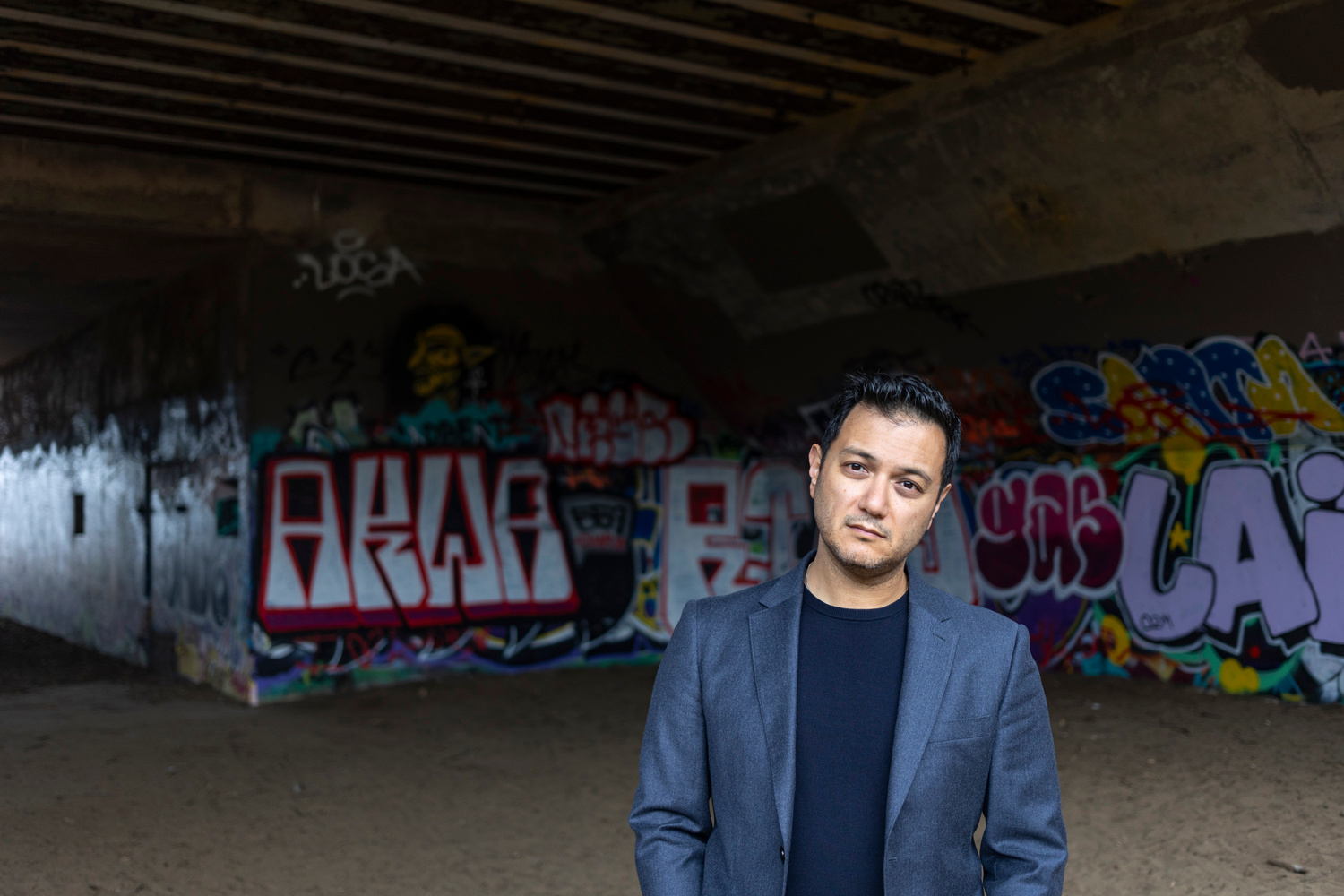
MASTERCLASS WITH
NICHOLAS PHAN
Featuring student artists from
Chicago College of Performing Arts
SEPTEMBER 6, 2024
2:00 pm
Ganz Hall
Sarah Collins, soprano
Harper Davis, mezzo-soprano
Nathaniel Eck, piano
Peter Lorenzo, tenor
Chiemerie Obianom, baritone
Selections shared from the stage
CONCERT II
SHAKESPEARE’S
PEOPLE
Hannah De Priest, soprano
Brent Funderburk, piano
Cindy Gold, actor
Lindsay Metzger, mezzo-soprano
Nicholas Phan, tenor & artistic director
Schyler Vargas, baritone
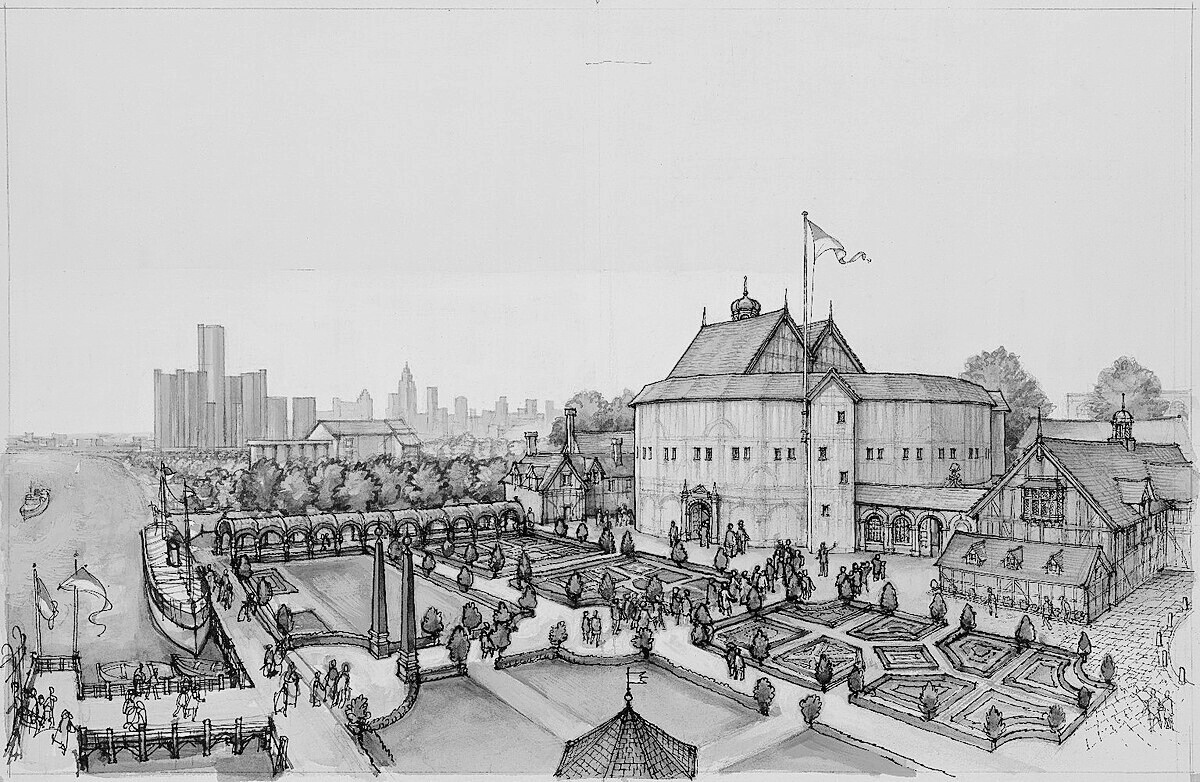
SEPTEMBER 7, 2024
2:00 pm
Ganz Hall
PROGRAM
I
“I boarded the king’s ship”
Come Unto These Yellow Sands, from Ariel
The Fool
II
The Map Of The World
O, never say that I was false of heart
III
“The raven himself is hoarse”
Lady Macbeth
IV
Come Away, Death
from Let us Garlands Bring
V
Is there more toil? from Ariel
Where the Bee Sucks
“All the world’s a stage”
When Birds Do Sing
- INTERMISSION -
VI
Sigh No More, Ladies
“But I do think their husband’s faults”
Desdemona’s Song
VII
“It is not the fashion...”
Rosalind
Here is a space
All love is lunacy
...no explanation is needed
Take my fear take my feeling
You do not get to dress me
VIII
Ophelia
La mort d'Ophélie
Women have loved before
From Songs and Sonnets to Ophelia
IX
“I am undone by his going”
House and Home
The Tempest, Act 1, sc. 2
Jonathan Dove (b. 1959)
Mario Castelnuovo-Tedesco (1895-1968)
Nico Muhly (b. 1981)
Peter Lieberson (1946-2011)
Macbeth, Act 1, sc. 5
Joseph Horovitz (1926-2022)
Gerald Finzi (1901-1956)
Jonathan Dove
David Lang (b. 1957)
As You Like It, Act II, sc. 7
Erich Wolfgang Korngold (1897-1957)
Mario Castelnuovo-Tedesco
Othello, Act IV, sc. 3
, Erich Korngold
As You Like It, Epilogue
Hannah Kendall (b. 1984)
Mario Castelnuovo-Tedesco
Hector Berlioz (1803-1869)
Jake Heggie (b. 1961)
Henry IV, Part II, Act II, sc. 1
Michael Torke (b. 1961)
Texts and Translations
SHAKESPEARE’S TIME
A painted tale
A painted tale by poets’ skill devised
Where words well plac’d great
store of love profess’d
In Love’s attire can never mask disguis’d;
For looks and sighs true love can best express
And he whose words his passions right can tell
Doth more in words than in true love excel
I do much wonder that one man, seeing how much another man is a fool when he dedicates his behaviors to love, will, after he hath laughed at such shallow follies in others, become the argument of his own scorn by failing in love: and such a man is Claudio. I have known when there was no music with him but the drum and the fife; and now had he rather hear the tabour and the pipe: I have known when he would have walked ten mile a-foot to see a good armour; and now will he lie ten nights awake, carving the fashion of a new doublet. He was wont to speak plain and to the purpose, like an honest man and a soldier; and now is he turned orthography; his words are a very fantastical banquet, just so many strange dishes. May I be so converted and see with these eyes? I cannot tell; I think not: I will not be sworn, but love may transform me to an oyster; but I'll take my oath on it, till he have made an oyster of me, he shall never make me such a fool. One woman is fair, yet I am well; another is wise, yet I am well; another virtuous, yet I am well; but till all graces be in one woman, one woman shall not come in my grace. Rich she shall be, that's certain; wise, or I'll none; virtuous, or I'll never cheapen her; fair, or I'll never look on her; mild, or come not near me; noble, or not I for an angel; of good discourse, an excellent musician, and her hair shall be of what colour it please God. Ha! the prince and Monsieur Love! I will hide me in the arbour.
From Much Ado About Nothing
Ch'amor sia nudo | That love is naked
Ch'amor sia nudo, e pur con l'ali al tergo
That love is naked, and even with wings on its back,
Stia sotto il cielo e non procuri albergo
that it lives under the heavens and needs no shelter
È verità.
That is truth.
Ma che per gli occhi egli dicend' al petto
But that, through the eyes, it descends into the breast,
Et ivi posi et ivi abbia ricetto
and there it settles, and there it finds refuge
È verità.
That is truth.
Che fra mortali, e che fra cor celesti
That among mortals, and among heavenly hearts,
Leggier sen voli, e non gia mai s’arresti
It flies lightly, and never rests
Ma ch’ove posi un giorno sol le piume
But that, wherever it rests its feathers, even for just one day,
Eternamente abbia di star costume
it remains there forever out of habit
È verità.
That is truth.
Et io mel so, che s’egli avvien ch’io nieghi,
And I know, that if it happens that I should refuse,
Cha suoi fier gioghi questo collo io pieghi
to bend my neck to its fierce yoke
Ma s’io dirò, che ‘n amorose tempre,
But if I say that, in amorous tempers,
Et ardo, et arsi, et arderò mai sempre
I burn, and have burned, and will always burn.
È verità.
That is vanity.
Have you seen but a bright lily?
Have you seen but a bright lily grow
before rude hands had touch'd it;
Have you mark'd but the fall of the snow
before the Earth hath smucht it.
Have you felt the wool of Beaver,
Or Swansdown ever;
or have smelt of the Bud of the Bryer,
Or the Nard in the fire;
Or have tasted the Bag of the Bee;
O so whyte, O so soft, O so sweet,
So sweet,
So sweet is she!
O so whyte, O so soft, O so sweet,
so sweet, so sweet is she!
Come Again, sweet love doth now invite
Come again, sweet love doth now invite
Thy graces, that refrain
To do me due delight,
To see, to hear, to touch, to kiss, to die
With thee again in sweetest sympathy.
All the day the sun that lends me shine
By frowns do cause me pine,
And feeds me with delay;
Her smiles my springs that makes my joys to grow;
Her frowns the winters of my woe.
Out alas, my faith is ever true;
Yet will she never rue,
Nor yield me any grace.
Her eyes of fire, her heart of flint is made,
Whom tears nor truth may once invade.
Gentle Love, draw forth thy wounding dart,
Thou canst not pierce her heart;
For I, that to approve,
By sighs and tears more hot than are thy shafts
Did tempt, while she for triumph laughs.
My mistress’ eyes are nothing like the sun;
Coral is far more red than her lips’ red;
If snow be white, why then her breasts are dun;
If hairs be wires, black wires grow on her head.
I have seen roses damasked, red and white,
But no such roses see I in her cheeks;
And in some perfumes is there more delight
Than in the breath that from my mistress reeks.
I love to hear her speak, yet well I know
That music hath a far more pleasing sound.
I grant I never saw a goddess go;
My mistress, when she walks, treads on the ground.
And yet, by heaven, I think my love as rare
As any she belied with false compare.
Sonnet 130
Due luci direnti | Two lights directing
Due luci direnti con sguardo sereno
Two lights directing with a serene gaze
Di dolci tormenti m’ingombrano il seno
With sweet torments they encumber my breast
Ma lampi d’amore rapiscono il core
But flashes of love steal my heart
Con furto gentile la libertà.
With gentle theft freedom.
Pur lieto vivra quest’alma cantandora
This soul will live happily singing
Penando celeste belta, t’adora penando celeste belta
Now suffering celestial beauty, adores you suffering celestial beauty.
Mark how the blushful morn
Mark how the blushful morn in vain
Courts the armorous marigold
With sighing blush and weeping rain,
Yet she refuses to unfold.
But when the planet of the day
Approacheth with his pow’rful ray,
Then she spreads, then she receives
His warmer beams into her virgin leaves.
So may’st thou thrive in love, fond boy,
If silent tears and sighs discover
Thy grief, thou never shalt enjoy
The just reward of a bold lover.
But when with moving accent thou
Shalt constant faith and service vow,
Thy celia shall receive those charms
With open ear, and with unfolded arms.
Fire Fire
Fire, fire! Lo here I burn in such desire,
That all the tears that I can strain
Out of my lovesick, empty brain
Cannot allay my scorching pain.
Come Humber, Trent,
and silver Thames:
Dread Ocean haste
with all thy streams,
And if thou canst not quench my fire,
O drown both me and my desire.
Fire, fire! There is no hell to my desire,
See all the rivers backward fly
For fear my heart
would drink them dry.
Come heavenly showers,
come pouring down,
Come you that once
the world did drown,
And if thou canst not quench my fire,
O drown both me and my desire.
Why Stays the Bridegroom?
Why stays the bridegroom to invade her that would be a matron made?
Goodnight, whilst yet we may goodnight to you a virgin say.
Tomorrow rise the same Your mother is and use a nobler name.
Speed well in Hymen’s war, that what you are,
By your perfections we and all may see.
When in disgrace with fortune and men’s eyes,
I all alone beweep my outcast state,
And trouble deaf heaven with my bootless cries,
And look upon myself and curse my fate,
Wishing me like to one more rich in hope,
Featured like him, like him with friends possessed,
Desiring this man’s art and that man’s scope,
With what I most enjoy contented least;
Yet in these thoughts myself almost despising,
Haply I think on thee, and then my state,
Like to the lark at break of day arising
From sullen earth, sings hymns at heaven’s gate;
For thy sweet love remembered such wealth brings
That then I scorn to change my state with kings.
Sonnet 29
My Thoughts Are Winged With Hopes
My thoughts are winged with hopes, my hopes with love.
Mount, Love, unto the moon in clearest night,
And say, as she doth in the heavens move,
In earth, so wanes and waxeth my delight.
And whisper this but softly in her ears:
Hope oft doth hang the head and Trust shed tears.
And you, my thoughts, that some mistrust do carry,
If for mistrust my mistress do you blame,
Say though you alter, yet you do not vary,
As she doth change and yet remain the same.
Distrust doth enter hearts but not infect,
And love is sweetest seasoned with suspect.
If she for this with clouds do mask her eyes,
And make the heavens dark with her disdain,
With windy sighs disperse them in the skies,
Or with thy tears dissolve them into rain,
Thoughts, hopes and love, return to me no more
Till Cynthia shine as she hath done before.
Farewell, Too Faire
Farewell too faire, too chast but too too cruel
Discretion never quenched fire with swords:
Why hast thou made my heart thine angers fuel
And now would kill my passions with thy words
This is proud beauties true anatomy
If that secure severe in secrecy, farewell.
As an unperfect actor on the stage
Who with his fear is put beside his part,
Or some fierce thing replete with too much rage,
Whose strength’s abundance weakens his own heart;
So I for fear of trust forget to say
The perfect ceremony of love’s rite,
And in mine own love’s strength seem to decay,
O’ercharged with burden of mine own love’s might.
O, let my books be then the eloquence
And dumb presagers of my speaking breast,
Who plead for love and look for recompense
More than that tongue that more hath more expressed.
O, learn to read what silent love hath writ.
To hear with eyes belongs to love’s fine wit.
Sonnet 23
Can She Excuse My Wrongs?
Can she excuse my wrongs with Virtue’s cloak?
Shall I call her good when she proves unkind?
Are those clear fires which vanish into smoke?
Must I praise the leaves where no fruit I find?
No, no; where shadows do for bodies stand,
That may’st be abus’d if thy sight be dim.
Cold love is like to words written on sand,
Or to bubbles which on the water swim.
Wilt thou be thus abused still,
Seeing that she will right thee never?
If thou canst not o’ercome her will,
Thy love will be thus fruitless ever.
Was I so base, that I might not aspire
Unto those high joys which she holds from me?
As they are high, so high is my desire,
If she this deny, what can granted be?
If she will yield to that which reason is,
It is reason’s will that love should be just.
Dear, make me happy still by granting this,
Or cut off delays if that I die must.
Better a thousand times to die
Than for to love thus still tormented:
Dear, but remember it was I
Who for thy sake did die contented.
Some glory in their birth, some in their skill,
Some in their wealth, some in their body’s force,
Some in their garments, though newfangled ill,
Some in their hawks and hounds, some in their horse;
And every humor hath his adjunct pleasure,
Wherein it finds a joy above the rest.
But these particulars are not my measure;
All these I better in one general best.
Thy love is ⌜better⌝ than high birth to me,
Richer than wealth, prouder than garments’ cost,
Of more delight than hawks or horses be;
And having thee, of all men’s pride I boast.
Wretched in this alone, that thou mayst take
All this away, and me most wretched make.
Sonnet 91
Lasciatemi qui solo | Leave me here alone
Lasciatemi qui solo
Leave me here alone,
Torante augelli al nido
Return, birds, to your nests,
Mentre l’anim’e ‘l duolo
While my soul, and my pain
Spiro su questo lido
I give up on these shores.
Altri meco non voglio
I want no one else with me
Ch’un freddo scoglio
Other than a cold rock,
E ‘l moi fatal martire
And my fated death.
Lasciatemi moirire
Leave me to die.
Dolcissime sirene
Sweetest sirens
Che’n si pietoso canto
Who with such merciful song
Raddolcite mie pene
Sweeten my sufferings and
Fate soave il pianto
Soften my weeping
Movet’ il nuoto altronde
Go elsewhere to swim
Togliete all’onde
Dampen the waves’
I crudi sdegni, e l’ire
Cruel scorn, and their ire
Lasciatemi morire
Leave me to die.
Placidissimi venti
Calmest winds
Torante al vostro speco
Return to your cave
Sol miei duri lamenti
I ask that only my harsh laments
Chieggo che restin meco
Remain with me
Vostri sospir non chiamo
I do not call upon your sighs
Solingo bramo
Alone I wish
I miei dolor finire
To end my sufferings
Lasciatemi morire
Leave me alone to die.
Velocissimi amanti
Happiest lovers
Torante al bel diletto
Return to your beautiful pleasures
Fere eccels’o notanti
Wild beasts, whether birds or fish
Fuggite il mesto aspetto
Flee from this sad countenance
Sol dolcezza di morte
Only the sweetness of death
Apra le porte
Should open its doors
All’ ultimo Languire
To this final languishing
Lasciatemi morire
Leave me to die.
Avarissimi lumi
Most avaricious eyes
Che su ‘l morir versate
That on point of death spill
Amarissimi fiumi
The bitterest rivers
Tard’e vostra pietate
Your pity comes too late
Gia mi sento mancare
Already I feel myself fail
O luci avar’e
Oh eyes, stingy
Tarde al mio conforto
And slow to comfort me
Gia sono esangu’e smorto
I am already bloodless and lifeless.
Si dolce è’l tormento | So sweet is the torment
Si dolce è’l tormento
So sweet is the torment
Ch’in seno mi sta,
That lies in my heart,
Ch’io vivo contento
That I can live content
Per cruda beltà.
With unfeeling, infatuating beauty.
Nel ciel di bellezza
In this earthly paradise
S’accreschi fierezza
Vanity grows
Et manchi pietà:
And piety fades:
Che sempre qual scoglio
Yet like a rock
All’onda d’orgoglio
Against the wave of pride
Mia fede sarà.
My faith will always hold fast.
La speme fallace
False hope
Rivolgam’ il piè,
Turns away from me,
Diletto ne pace
Neither pleasure nor peace
Non scendano a me,
Descend upon me,
E l’empia ch’adoro
And the unholy woman I adore
Mi nieghi ristoro
Does not grant me the relief
Di buona mercè:
Of her favour:
Tra doglia infinita,
Amidst infinite pain
Tra speme tradita
Amidst forlorn hope
Vivrà la mia fè.
My faith will live on.
Se fiamma d’amore
If the flame of love
Già mai non sentì
Has never yet been felt
Quel rigido core
By the hard heart
Ch’il cor mi rapì,
That has stolen my own,
Se nega pietate
If I am shown no pity
La cruda beltate
By the cruel siren
Che l’alma invaghì:
That has enchanted my soul:
Ben fia che dolente,
Then let it be that one day,
Pentita e languente
Languishing in pain and repentance,
Sospirimi un dì.
She will sigh for me.
So, so leave off this last lamenting kiss
So, so leave off this last lamenting kiss
Which sucks two souls, and vapours both away;
Turn, thou ghost, that way, and let me turn this,
And let ourselves benight our happy day,
We ask none leave to love, nor will we owe
Any so cheap a death as saying "Go."
Go; and if that word have not quite killed thee,
Ease me with death by bidding me go too.
Or, if it have, let my word work on me,
And a just office on a murderer do.
Except it be too late, to kill me so,
Being double dead, going, and bidding, "Go."
Farewell, thou art too dear for my possessing,
And like enough thou know’st thy estimate.
The charter of thy worth gives thee releasing;
My bonds in thee are all determinate.
For how do I hold thee but by thy granting,
And for that riches where is my deserving?
The cause of this fair gift in me is wanting,
And so my patent back again is swerving.
Thy self thou gav’st, thy own worth then not knowing,
Or me, to whom thou gav’st it, else mistaking;
So thy great gift, upon misprision growing,
Comes home again, on better judgment making.
Thus have I had thee as a dream doth flatter,
In sleep a king, but waking no such matter.
Sonnet 87
Now, oh now I needs must part
Now, oh now I needs must part,
Parting though I absent mourn.
Absence can no joy impart;
Joy once fled cannot return.
While I live I needs must love,
Love lives not when Hope is gone.
Now at last Despair doth prove,
Love divided loveth none.
Dear when I from thee am gone,
Gone are all my joys at once,
I lov’d thee and thee alone,
In whose love I joyed once.
And although your sight I leave,
Sight wherein my joys do lie.
Till that death doth sense bereave,
Never shall affection die.
Dear, if I do not return,
Love and I shall die together.
For my absence never mourn
Whom you might have joyed ever;
Part we must though now I die,
Die I do to part with you.
Him despair doth cause to lie
Who both liv’d and dieth true.
Sad despair doth drive me hence;
This despair unkindness sends.
If that parting be offense,
It is she which then offends.
Stay, Silly Heart
Stay, silly heart and do not break,
But give a lover leave to speak,
to tell a tale that stones may move
to pity me that dies for love.
Thy heart is harder far than flint,
And will not suffer Cupid’s print
But beats his arrows back to Jove
By which, alas I die for love.
When I am gone, true lovers mourn
Deck all your heads with wither’d corn
Wear on your hand a sable glove
To rectify I died for love.
Then bear my softly by hear door
And there with mourning heads deplore.
Cry loud, look down you power’s above,
On her that flew me for her love.
Then in an unfrequented cave
Where fairies haunt, prepare my grave
Among wilde satyrs in a grove
That they may sing, I died for love
Last, build my tomb of lovers bones
Set round about with marble stones.
My schutcheon bearing Venus Dove
My epitaph, ‘I died for Love.’
Tell me, O love
Tell me, O love, when shall it be
That thy fair eyes shall shine on me
Whom nothing now reviveth?
I pray thee, shepherd,
I pray thee, shepherd, leave thy fears;
Drown not thy heart and eyes with tears;
Such sighs my sense depriveth
Alas, my love, I cannot choose,
Since thou estranged lived from me,
O do not me for that accuse,
My love, my life doth live in thee,
Alas, what joy is in such love
That ever lives apart,
And never other comforts prove
But cares that kill the heart?
O let me die! And so will I!
Yet stay, sweet love, and sing this song with me:
Time brings to pass what love thinks could not be.
Fair, Cruel Nymph
Fair, cruel Nymph, why thus in grief and anguish
Makst thou him that adores thee pine and languish?
Why, shepherd, dost thou me condemn as cruel,
Since thine own fancies are thy passions’ fuel?
O but these fancies from thy beauty
Let me not to the marriage of true minds
Admit impediments. Love is not love
Which alters when it alteration finds
Or bends with the remover to remove.
O, no, it is an ever-fixèd mark
That looks on tempests and is never shaken;
It is the star to every wand’ring bark,
Whose worth’s unknown, although his height be taken.
Love’s not Time’s fool, though rosy lips and cheeks
Within his bending sickle’s compass come;
Love alters not with his brief hours and weeks,
But bears it out even to the edge of doom.
If this be error, and upon me proved,
I never writ, nor no man ever loved.
Sonnet 116
No More Shall Meads
No more shall meads be deck'd with flowers
Nor sweetness dwell in rosy bowers,
Nor greenest buds on branches spring,
Nor warbling birds delight to sing,
Nor April violets paint the grove,
If I forsake my Celia's love.
The fish shall in the ocean burn,
And fountains sweet shall bitter turn;
The humble oak no flood shall know,
When floods shall highest hills o'er-flow;
Blacke Lethe shall oblivion leave,
If e'er my Celia I deceive.
Love shall his bow and shaft lay by,
And Venus' doves want wings to fly;
The sun refuse to show his light,
And day shall then be turn'd to night;
And in that night no star appear,
If once I leave my Celia dear.
Love shall no more inhabit earth,
Nor lovers more shall love for worth,
Nor joy above in heaven dwell,
Nor pain torment poor souls in hell;
Grim death no more shall horrid prove,
If e'er I leave bright Celia's love.
Texts and Translations
SHAKESPEARE’S PEOPLE
I boarded the king's ship; now on the beak, Now in the waist, the deck, in every cabin, I flamed amazement: sometime I'd divide, And burn in many places; on the topmast, The yards and bowsprit, would I flame distinctly, Then meet and join. Jove's lightnings, the precursors O' the dreadful thunder-claps, more momentary And sight-outrunning were not; the fire and cracks Of sulphurous roaring the most mighty Neptune Seem to besiege and make his bold waves tremble, Yea, his dread trident shake...Not a soul But felt a fever of the mad and play'd Some tricks of desperation. All but mariners Plunged in the foaming brine and quit the vessel, Then all afire with me: the king's son, Ferdinand, With hair up-staring,--then like reeds, not hair,-- Was the first man that leap'd; cried, 'Hell is empty And all the devils are here.’
From The Tempest
Come Unto These Yellow Sands
Come unto these yellow sands, and then take hands:
Curtsied when you have and kissed the wild waves whist,
Foot it featly here and there; and, sweet sprites, the burden bear.
The watch-dogs bark!
Hark, hark! I hear!
Come unto these yellow sands, and then take hands:
The strain of strutting chanticleer
Cry, Cock-a-diddle-dow.
The never surfeited sea. The never. The never.
The Fool
Have more than thou showest, Speak less than thou knowest
Lend less than thou owest, Ride more than thou goest,
Learn more than thou trowest, Set less than thou throwest;
Leave thy drink and thy whore, and keep in a door,
And thou shalt have more than two tens to a score.
That lord, that counsel’d thee to give away the land,
Come place him here by me, do thou for him stand:
The sweet and bitter fool will presently appear;
The one in motley here. the other found out there.
Fools had ne’er less grance in a year: For wise men are grown foppish
And know not how their wits to wear, their manners are so apish!
Then they for sudden joy did weep, and I for sorrow sung,
That such a king should play bo-peep, and go the fools among.
Fathers, that wear rags, do make their children blind;
But fathers, that wear bags, do make their children kind.
Fortune, fortune, that arrant whore, ne’er turns the key to the poor.
That sir, that serves and seeks for gain, and follows but for form,
Will pack when it’s begin to rain, and leave thee in the storm.
But I will tarry; the fool will stay, and let the wine man fly:
The knave turns fool that runs away; the fool no knave, perdy!
He that has but a little tiny wit, - with hey, ho, the win and the rain,
Must make content with his fortune fit; though it raineth everyday.
The Map Of The World
My dame, you be of all beauty the shrine,
As far as is circled the mappa mundi
For just as the crystal glorious you shine
And like ruby your cheeks be round
There with you be so merry and so jocund!
And though I weep a tyne of tears,
Yet may that woe my heart not wound...
Suffice me to love you, Rosamund.
Honey tongued Shakespeare, when I saw thine issue,
I swore Apollo got them and none other;
Their rosy-tinted features clothed in tissue,
Some heaven born goddess said to be their mother...
My mistress’ eyes are nothing like the sun;
Coral is far more red than her lips’ red...
I love to hear her speak, yet well I know
That music hath a far more pleasing sound;
I grant I never saw a goddess go;
My mistress, when she walks, treads on the ground
And yet by heave, I think my love as rare
As any she belied with false compare.
O, never say that I was false of heart
O never say that I was false of heart though absence seemed
My flame to qualify, to qualify, my flame, my flame to qualify.
As easy might I from myself depart, as from my soul
Which in thy breast doth lie; that is my home love.
If I have ranged, like him that travels, I return again,
Just to the time, not with the time exchanged,
So that myself bring water for my stain,
Never believe though in my nature reigned all frailties
That besiege all kinds of blood, that it would so preposterously be stained
Never believe though in my nature reigned, all frailties that besiege
All kinds of blood that besiege to leave for nothing all thy sum of good;
For nothing this whole universe I call save thou my rose,
In it thou art my all. To leave for nothing all thy sum of good:
For nothing this whole universe I call, save thou my rose,
In it though art my all.
The raven himself is hoarse That croaks the fatal entrance of Duncan Under my battlements. Come, you spirits That tend on mortal thoughts, unsex me here, And fill me from the crown to the toe top-full Of direst cruelty! make thick my blood; Stop up the access and passage to remorse, That no compunctious visitings of nature Shake my fell purpose, nor keep peace between The effect and it! Come to my woman's breasts, And take my milk for gall, you murdering ministers, Wherever in your sightless substances You wait on nature's mischief! Come, thick night, And pall thee in the dunnest smoke of hell, That my keen knife see not the wound it makes, Nor heaven peep through the blanket of the dark, To cry 'Hold, hold!' Great Glamis! worthy Cawdor! Greater than both, by the all-hail hereafter! Thy letters have transported me beyond This ignorant present, and I feel now The future in the instant
From Macbeth
Lady Macbeth
Glamis thou art, and Cawdor, and shalt be
What thou art promised.
Yet do I fear thy nature;
It is too full o’ th’ milk of human kindness
To catch the nearest way.
Thou wouldst be great,
Art not without ambition, but without
The illness should attend it.
What thou wouldst highly,
That wouldst thou holily;
wouldst not play false
And yet wouldst wrongly win.
Hie thee hither,
That I may pour my spirits in thine ear
And chastise with the valor of my tongue
All that impedes thee from golden round,
Which fate, metaphysical aid doth seem
To have thee crowned withal.
Great Glamis, worthy Cawdor,
Greater than both by the all-hail hereafter!
Thy letters have transported me beyond
This ignorant present, and I feel now
The future in the instant.
He is about it:
Their doors are open; and the surfeited grooms
Do mock their charge with snores:
I have drugg'd their possets,
That death and nature do contend about them,
Whether they live or die...
I laid their daggers ready;
He could not miss 'em. Had he not resembled
My father as he slept, I had done't
Why did you bring these daggers from the place?
They must lie there: go carry them; and smear
The sleepy grooms with blood...
Infirm of purpose!
Give me the daggers: the sleeping and the dead
Are but as pictures: 'tis the eye of childhood
That fears a painted devil. If he do bleed,
I'll gild the faces of the grooms withal;
For it must seem their guilt.
Come Away Death
Come away, come away, death
And in sad cypress let me be laid
Fly away, fly away, breath;
I am slain by a fair cruel maid
My shroud of white, stuck all with yew
O, prepare it!
My part of death, no one so true
Did share it.
Not a flower, not a flower sweet
On my black coffin let there be strown
Not a friend, not a friend greet
My poor corpse, where my bones shall be thrown
A thousand thousand sighs to save
Lay me, O, where
Sad true lover never find my grave
To weep there!
Is There More Toil?
Is there more toil? Since thou dost give me pains,
Let me remember thee what thou has promised,
Which is not yet performed me.
My liberty - my liberty! I drink the air before me!
Where the bee sucks, there suck I, in a cow slips bell I lie;
There I crouch when owls do cry
On the bat’s back I do fly after summer merrily, merrily.
Merrily, merrily shall I live now, shall I live now.
Under the blossom that hangs on the bough
I drink the air before me! I go! I go!
Where the bee sucks
Where the bee sucks, there suck I:
In a cowslip’s bell I lie;
There I couch when owls do cry.
On the bat’s back I do fly
After summer merrily.
Merrily, merrily shall I live now
Under the blossom that hangs on the bough.
All the world’s a stage,
And all the men and women merely players;
They have their exits and their entrances;
And one man in his time plays many parts,
His acts being seven ages. At first the infant,
Mewling and puking in the nurse’s arms;
And then the whining school-boy, with his satchel
And shining morning face, creeping like snail
Unwillingly to school. And then the lover,
Sighing like furnace, with a woeful ballad
Made to his mistress’ eyebrow. Then a soldier,
Full of strange oaths, and bearded like the pard,
Jealous in honour, sudden and quick in quarrel,
Seeking the bubble reputation
Even in the cannon’s mouth. And then the justice,
In fair round belly with good capon lin’d,
With eyes severe and beard of formal cut,
Full of wise saws and modern instances;
And so he plays his part. The sixth age shifts
Into the lean and slipper’d pantaloon,
With spectacles on nose and pouch on side;
His youthful hose, well sav’d, a world too wide
For his shrunk shank; and his big manly voice,
Turning again toward childish treble, pipes
And whistles in his sound. Last scene of all,
That ends this strange eventful history,
Is second childishness and mere oblivion;
Sans teeth, sans eyes, sans taste, sans everything.
From As You Like It
When Birds Do Sing
It was a lover and his lass
With a hey, and a ho, and a hey nonino
That o'er the green corn-field did pass
In the spring time, the only pretty ring time
The spring time, the only pretty ring time
When birds do sing, hey ding a ding a ding;
Sweet lovers love the spring.
This carol they began that hour
With a hey, and a ho, and a hey nonino
How that a life was but a flower
In the spring time, the only pretty ring time
The spring time, the only pretty ring time
When birds do sing, hey ding a ding a ding;
Sweet lovers love the spring.
And therefore take the present time
With a hey, and a ho, and a hey nonino
For love is crownéd with the prime
In the spring time, the only pretty ring time
The spring time, the only pretty ring time
When birds do sing, hey ding a ding a ding;
Sweet lovers love the spring.
Sigh No More
Sigh no more, ladies, sigh no more,
Men were deceivers ever; on foot in sea and one on shore;
To one thing constant never.
Then sigh not so, but let them go and be you blithe and bonny
Converting all your sound of woe into hey! nonny, nonny
Sing no more ditties, sing no more of dumps so dull and heavy:
The fraud of men was ever so, since summer first was leavy..
Then sigh not so, but let them go and be you blithe and bonny
Converting all your soun of woe into hey! nonny, nonny.
But I do think it is their husbands' faults If wives do fall: say that they slack their duties, And pour our treasures into foreign laps, Or else break out in peevish jealousies, Throwing restraint upon us; or say they strike us, Or scant our former having in despite; Why, we have galls, and though we have some grace, Yet have we some revenge. Let husbands know Their wives have sense like them: they see and smell And have their palates both for sweet and sour, As husbands have. What is it that they do When they change us for others? Is it sport? I think it is: and doth affection breed it? I think it doth: is't frailty that thus errs? It is so too: and have not we affections, Desires for sport, and frailty, as men have? Then let them use us well: else let them know, The ills we do, their ills instruct us so.
From Othello
Desdemona’s Song
The poor soul sat sighing by a sycamore tree
Sing all a green willow:
Her hand on her bosom, her head on her knee
Sing willow, willow, willow:
The fresh streams ran by her, and murmur'd her moans;
Sing willow, willow, willow;
Her salt tears fell from her, and soften'd the stones;
Sing willow, willow, willow;
Sing all a green willow my garland must be
Sing all a green willow;
Let nobody blame him; his scorn I approve
Sing willow, willow, willow
I call'd my love false love; but what said he then?
Sing willow, willow, willow:
If I court moe women, you'll couch with moe men!
Sing willow, willow, willow.
It is not the fashion to see the lady the epilogue; but it is no more unhandsome than to see the lord the prologue. If it be true that good wine needs no bush, 'tis true that a good play needs no epilogue; yet to good wine they do use good bushes, and good plays prove the better by the help of good epilogues. What a case am I in then, that am neither a good epilogue, nor cannot insinuate with you in the behalf of a good play! I am not furnished like a beggar, therefore to beg will not become me: my way is, to conjure you; and I'll begin with the women. I charge you, O women! for the love you bear to men, to like as much of this play as please you: and I charge you, O men! for the love you bear to women,'as I perceive by your simpering none of you hate them,'that between you and the women, the play may please. If I were a woman I would kiss as many of you as had beards that pleased me, complexions that liked me, and breaths that I defied not; and, I am sure, as many as have good beards, or good faces, or sweet breaths, will, for my kind offer, when I make curtsy, bid me farewell.
From As You Like It
Here is a space
A space to make.
I make --
my beauty hardened
my slyness opened
my boldness golden
my bravery outspoken
my voice deeper
and so people look beyond.
What I have to say is better now, cleverer somehow,
all because of my tone, my depth of vocal tone.
If only I had known, all these years of trying,
all I needed to do
was go down.
All love is lunacy
Now, I am a woman
or at least I am a woman as you like it to be.
Roses, tulips, bluebells, willow trees.
I feel heartache and pain
I feel the importance of being desired
again and again and again
I feel your kiss on my lips
I feel the way your eyes undress me.
Undress me.
Make me into a forest fairu
make me illuminate these dark shadows
with all that I have, a smile, one smile.
Make me stand here,
here is a space,
make me stand in it
as small as possible
my feet shrunken
my steps silent
my very breath yours
as you breathe for the both of us
and I’m stuck,
I’m a woman now
and I’m stuck
will I be a lucky one?
Lucky to be in love?
But surely
all love is a lunacy
a madness matched only by normality.
I look own at my body and wonder
is it madness to not know whose it is anymore
and if so, is that madness a sign of love
for my own body that I’ve not felt before?
No explanation is needed
I am neither he nor she
just a person who chooses daily what to be,
I feel no explanation is needed
it is what it is
so let me be.
Let me be here, in this space.
Let me choose my face
my woman face my man face
my beautiful bold brave face.
Take my fear, take my feeling
Now I am a man
Take my fear
Take my feeling
take my salty water
and stitch it up inside a sports pitch -
what sort of performance is this?
To try and make a mockery of a man,
to tell him he cannot be who he must be
in order to be someone who is alive?
Why?
There is beauty in bravery
there is boldness in empathy
there is woman in man
and man in woman
but now, in this space
I can see only
that I am man.
You do not get to dress me anymore
Now again, I am a woman.
I will keep
my bravery and my boldness
my beauty and my daintiness
my daring and my slyness
my sweetness and my kindness.
Yes.
You do not get to dress me anymore.
Ophelia
How should I know your true love know from another one?
By his cockle hat and staff, and his sandal shoon
He is dead and gone, lady, he is dead and gone,
At his head a grass-green turf,
At his heels a stone
White his shroud as the mountain’s snow, larded sweet with flowers
Which bewept to the grave did go with true love showers
Tomorrow is Saint Valentine’s day
All in the morning betime, and I a maid at your window
to be your Valentine,
Then up he rose, and donn’d his clothes and dupp’d his chamber door;
Let in the maid that out a maid never departed more
“By Gis, and by Saint Charity, Alack and fir for shame!”
You men will do’t if they come to’t by cock they are not to blame!
Quoth she “Before you tumble me, you promised me to wed.
So would I ha’done by younder sun, and thou hadst not come to my bed!”
They bore him barefaced on the bier, hey non, nonny, nonny, hey nonny;
And on his grave rain’d many a tears for Bonny sweet Robin is all my joy.
And will he not come again? And will he not come again?
No, no, he is dead, go to thy deathbed, he never will come again!
His beard was as white as snow, all flaxen was his poll
He is gone! And we cast away moan - God ha’ mercy on his soul!
And of all Christian souls! I pray God!
La Mort d’Ophélie | The Death of Ophelia
D'un torrent, Ophélie
Beside a stream, Ophelia,
Cueillait tout en suivant le bord,
Following along the bank, gathered,
Dans sa douce et tendre folie,
In her soft and gentle lunacy,
Des pervenches, des boutons d'or,
Periwinkles, buttercups,
Des iris aux couleurs d'opale,
Irises the colour of opal,
Et de ces fleurs d'un rose pâle
And those pale, rose-coloured flowers
Qu'on appelle des doigts de mort.
They call Dead Men's Fingers.
Puis élevant sur ses mains blanches
Then, lifting in her white hands
Les riants trésors du matin,
The happy treasure of the morning,
Elle les suspendait aux branches,
She hung them from the branches,
Aux branches d'un saule voisin;
From the branches of a nearby weeping willow;
Mais, trop faible, le rameau plie,
But too weak, the branch bends,
Se brise, et la pauvre Ophélie
[Then] breaks, and poor Ophelia
Tombe, sa guirlande à la main.
Falls, her garland in her hand.
Quelques instants, sa robe enflée
For a while, her swollen dress
La tint encor sur le courant,
Bore her on the current,
Et comme une voile gonflée,
And like a full sail,
Elle flottait toujours, chantant,
She kept floating, singing,
Chantant quelque vieille ballade,
Singing some ancient ballad
Chantant ainsi qu'une naïade
Singing like a water-sprite
Mais cette étrange mélodie
But this strange song
Passa rapide comme un son;
Faded, as rapidly as a sound,
Par les flots la robe alourdie
For the waves soon made her dress heavy
Bientôt dans l'abîme profond;
And down into the depths
Entraïna la pauvre insensée,
Dragged the poor, senseless girl,
Laissant à peine commencée
Leaving her melodious song
Sa mélodieuse chanson.
Hardly yet begun.
Women have loved before
Women have loved before as I love now;
At least, in lively chronicles of the past
Irish waters by a Cornish prow
Or Trojan waters by a Spartan mast
Much to their cost invaded
Here and there,
Hunting the amorous line
Skimming the rest,
I find some woman bearing as I bear love - Ah!
Like a burning city in the breast
I think however that of all alive
I only in such utter, ancient way
Do suffer love; in me alone survive
The unregenerate passions of a day
When treacherous queens, with death upon the tread,
Heedless and willful, took their knights to bed.
I am undone by his going; I warrant you, he's an infinitive thing upon my score. Good Master Fang, hold him sure: good Master Snare, let him not 'scape. A' comes continuantly to Pie-corner—saving your manhoods--to buy a saddle; and he is indited to dinner to the Lubber's-head in Lumbert street, to Master Smooth's the silkman: I pray ye, since my exion is entered and my case so openly known to the world, let him be brought in to his answer. A hundred mark is a long one for a poor lone woman to bear: and I have borne, and borne, and borne, and have been fubbed off, and fubbed off, and fubbed off, from this day to that day, that it is a shame to be thought on. There is no honesty in such dealing; unless a woman should be made an ass and a beast, to bear every knave's wrong. Yonder he comes; and that errant malmsey-nose knave, Bardolph, with him. Do your offices, do your offices: Master Fang and Master Snare, do me, do me, do me your offices.
From Henry IV, Part II
House and Home
He hath eaten me out of house and home;
He hath put all my substance into the fat belly of his but,
But I will have some of it out again, or I will ride thee o’nights like a mare.
He hath put all my substance into that fat, that belly of his
He hath eaten me out of house and home!
But I will have some of it, some of it out again
Or I will ride thee o’nights like a mare,
ARTIST BIOS
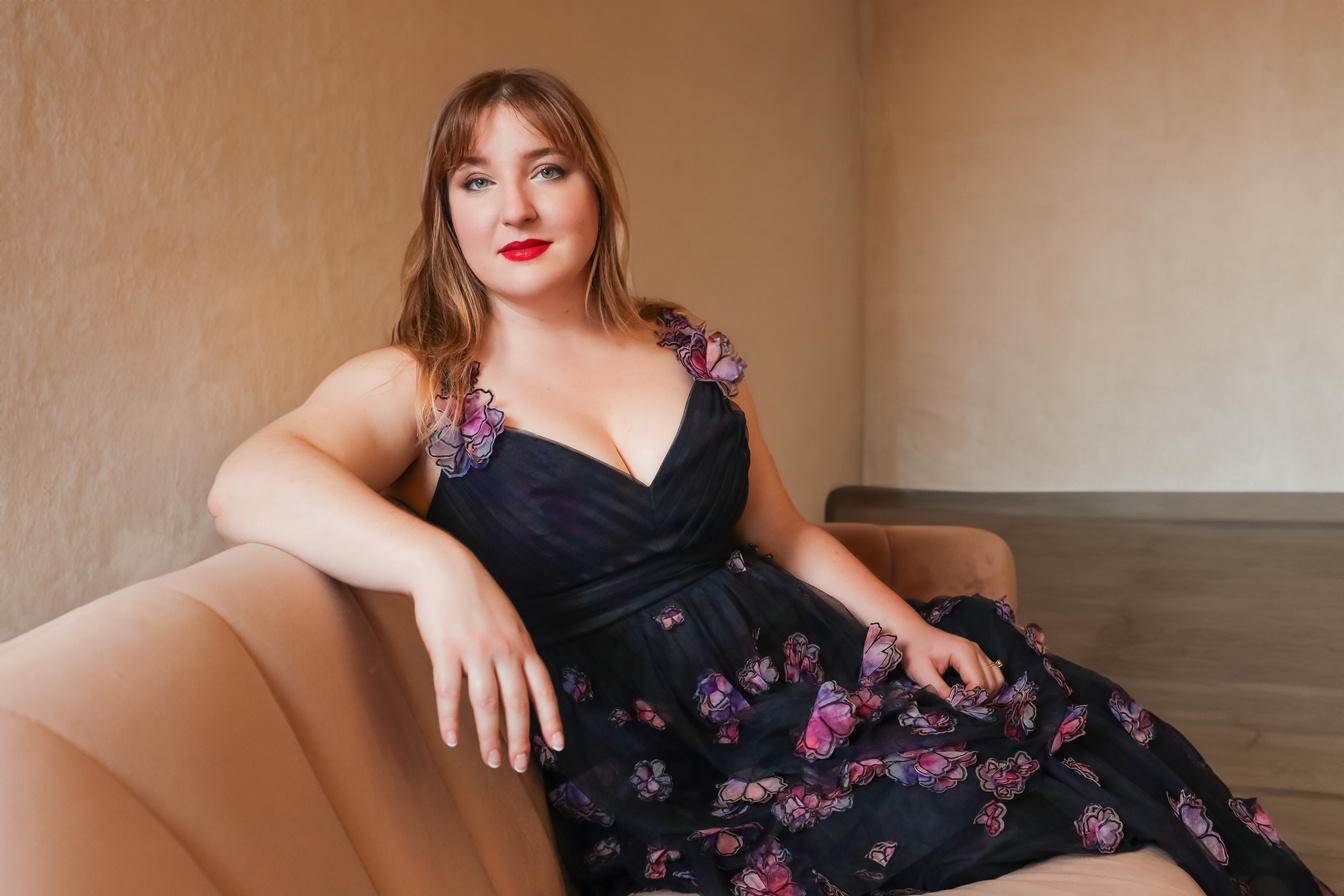
HANNAH DE PRIEST, soprano
With a “bright, ideally-focused sound, allied to a probing expressive intelligence” (Chicago Classical Review) Hannah De Priest is a fearless performer of a wide range of lyric soprano repertoire. Especially renowned for her “masterful” (Olyrix) singing of Baroque repertoire, the young soprano has made numerous important debuts in recent seasons, including her Kennedy Center debut (Opera Lafayette: Serpina, La servante maîtresse) and European debut at the Innsbruck Early Music Festival (Gilde, L’amazzone corsara). The Boston Globe named her “unmistakably the breakout artist” of the 2023 Boston Early Music Festival, at which she performed as a soloist in multiple concerts and two opera productions.
Hannah has earned recognition at numerous important competitions, winning second prize at the 2021 International Cesti Competition for Baroque Singing. She has been a finalist in the London Handel Competition (2024), American Handel Aria Competition (2021), Le Concours Corneille (2019), Audrey Rooney Bach Competition (2020), and the Bethlehem Bach Competition (2021).
A longtime resident of Chicago and an art song fanatic, Hannah is thrilled to make her CAIC debut with two programs at the 2024 Collaborative Works Festival. Later this fall, the soprano makes her Ars Lyrica Houston debut for a program of Bach and Hasse and performs cantatas by Graupner and Bach with Atlanta Baroque Orchestra. In October, Hannah will record her debut solo album of French and Italian baroque music with Les Délices. Next spring she returns to the storied Boston Early Music Festival as Livia in Keiser’s singspiel Octavia before touring and recording The Dragon of Wantley with the Festival’s orchestra in Europe.

BRENT FUNDERBURK, piano
One of the nation’s most promising collaborative pianists, Brent is also fast becoming known as a recitalist, coach, and music director. Having served as pianist and music director of the Metropolitan Opera’s nationwide Rising Stars Concert Series tour, he anchored the 2022 world premiere of Ricky Ian Gordon’s Intimate Apparel at Lincoln Center Theater, which was broadcast nationally on PBS Great Performances. He has graced Carnegie
Hall’s Weill Recital Hall, Lincoln Center’s Alice Tully Hall, the Chicago Cultural Center, and the Arts Club of Washington, among others.
A faculty member of the Schmidt Vocal Institute, he has performed art songs at festivals including Carnegie Hall’s Marilyn Horne Song Celebration and The Song Continues, the Ravinia Festival, and Music Academy of the West. His discography includes five albums, and he has been featured on radio broadcasts by Sirius XM, New York’s WQXR, Chicago’s WFMT, and Minnesota’s MPR. A graduate of Wisconsin’s Lawrence University and New York’s Juilliard School, where he was a staff pianist in the Ellen and James S. Marcus Institute for Vocal Arts, Funderburk served as the music director and collaborative pianist of Furman Lyric Theatre at Furman University in Greenville, South Carolina. He maintains a private coaching studio in Chicago.
CINDY GOLD. actor
Recent Chicago area appearances include The Most Spectacularly Lamentable Trial of Miz Martha Washington (Steppenwolf Theatre), Christmas Carol and Measure for Measure (Goodman Theater) Indecent (Victory Gardens), Cat on a Hot Tin Roof (Drury Lane), Taming of the Shrew (Chicago Shakespeare), and Lyric Opera in Showboat and My Fair Lady. Regionally, Cindy performed at Asolo Theatre, The Kennedy Center in Showboat and Daughter of the Regiment (where she shared a role with Ruth Bader Ginsburg!) She appeared in The Music Man at Glimmerglass Opera, both in New York and at the Royal Opera House in Muscat. Cindy won a Jeff award for playing Gertrude Stein in Frank Galati and Stephen Flaherty’s Loving Repeatingork in Progress, Empire, Chicago Fire, and the pilot episode of TNT’s Leverage. Cindy is a Professor Emeritus of Theatre at Northwestern University.

JIM IORIO, actor
Recognized both locally and nationally, the Jim Iorio’s New York credits include: Broadway in the Tony Award-nominated A View from the Bridge (with Scarlett Johansson Liev Schreiber), Off-Broadway in A Stone Carvander (opposite Dan Lauria), and Kaos at the New York Theatre Workshop, directed by MacArthur Award-winner, Martha Clarke.
Iorio’s regional work include leading roles at major theatres nationwide, including the Guthrie Theatre, Utah Shakespeare Festival, Arizona Theatre, San Jose Rep, Missouri Rep, Portland Center Stage, Geva Theatre, Asolo Theatre and more.

He’s directed at the New York International Fringe Festival and received the Kennedy Center American College Theatre Festival Directing Award for his production of Tartuffe. Television/film work includes principal roles on Grimm, Leverage, Multiple episodes of Law & Order, Queens Supreme, The Street, Another World, One Life to Live, Loving, Going the Distance, and Petty Crimes. Playwriting work includes a new translation of Carlo Gozzi’s The Raven, and powerful 90-minute adaptations of Shakespeare’s Macbeth, Julius Caesar, and As You Like It (all available for production). His upcoming projects include a recurring role on the audio drama: Mission: Rejected, now in its fifth season; he’ll direct Schoenberg’s Pierrot Lunaire at Guarneri Hall this December; his adaptation of Julius Caesar will be produced in Michigan this fall and he is currently directing As You Like It at CCPA/Roosevelt University, where he is a professor of theatre. He holds an MFA from NYU’s Tisch School of the Arts Graduate Acting Program and a certificate from the Moscow Art Theatre.
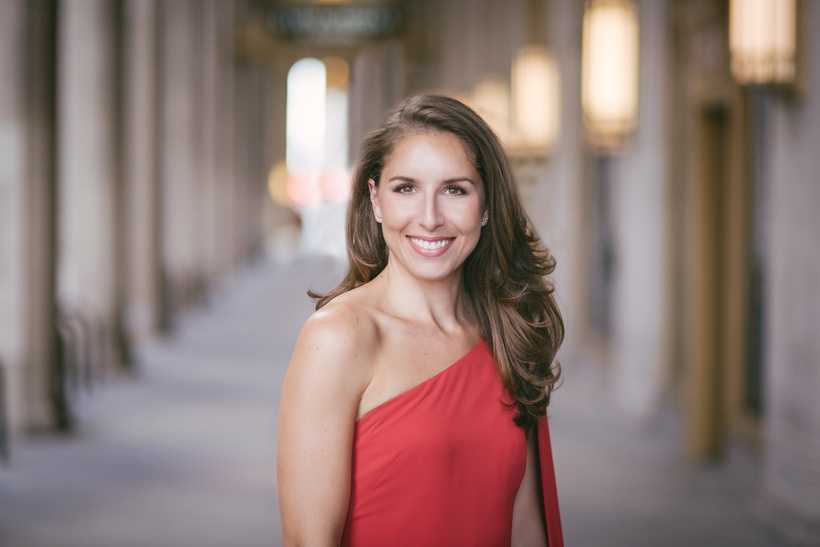
LINDSAY METZGER, mezzo-soprano
Lindsay Metzger is noted for her “easy stage manner and refined voice” (Chicago Classical Review). During the 2023-24 season, Lindsay sang Melissa in La liberazione di Ruggiero dall’Isola d’Alcina with Haymarket Opera, was the alto soloist for Beethoven’s Ninth Symphony with the Southwest Michigan Symphony Orchestra, sang the title of Songbird with Florentine Opera, reprised her role in Anna Karenina with the Joffrey Ballet and sang a recital in her HALO debut. During the 2024-25 season, Lindsay will make her CAIC debut in their concert of Shakespeare inspired selections, and makes her Southwest Suburban Symphony debut as Hansel in Hansel and Gretel.
During the 2022-2023 season. Lindsay returned to Dallas Opera to sing Sandman and cover Hansel in Hansel and Gretel, joined the roster of the Metropolitan Opera to cover Flora in La traviata, returned to Haymarket Opera Company to sing Nerone in L'incoronazione di Poppea, and sang Stéphano in Roméo et Juliette with Opera San Antonio, as well as singing three performance periods of the Joffrey Ballet’s Anna Karenina.
Lindsay recently made her company debut with Austin Opera as Cherubino in Le nozze di Figaro, covered Niklausse in Les Contes d'Hoffmann, joined Washington Concert Opera as Miss Rose in Lakmé and was slated to return to the Lyric Opera of Chicago to cover Taller Sister in Missy Mazzoli and Royce Vavrek’s Proving Up (Canceled due to COVID19).
ADRIAN MURILLO, lute
Adrian Murillo is currently a student at Jacobs School of Music finishing his doctoral studies in Historical Performance on lute and theorbo. He obtained his bachelor and master’s degrees at the San Francisco Conservatory of Music on classical guitar and historical plucked instruments, having studied under David Tanenbaum, Marcin Dylla, John Dearman, Judicaël Perroy, Richard Savino, and currently with Nigel North. Adrian has performed as a soloist and in orchestras in the United States and Mexico with groups such as the San Francisco Opera, Bay Area Classical Harmonies, West Bay Opera, Opera Neo, Mission Chamber Orchestra and the SFCM Baroque Orchestra among others.
Adrian also specializes in the performance of ninteenth-century guitar repertoire and instruments as well as flamenco guitar performance.
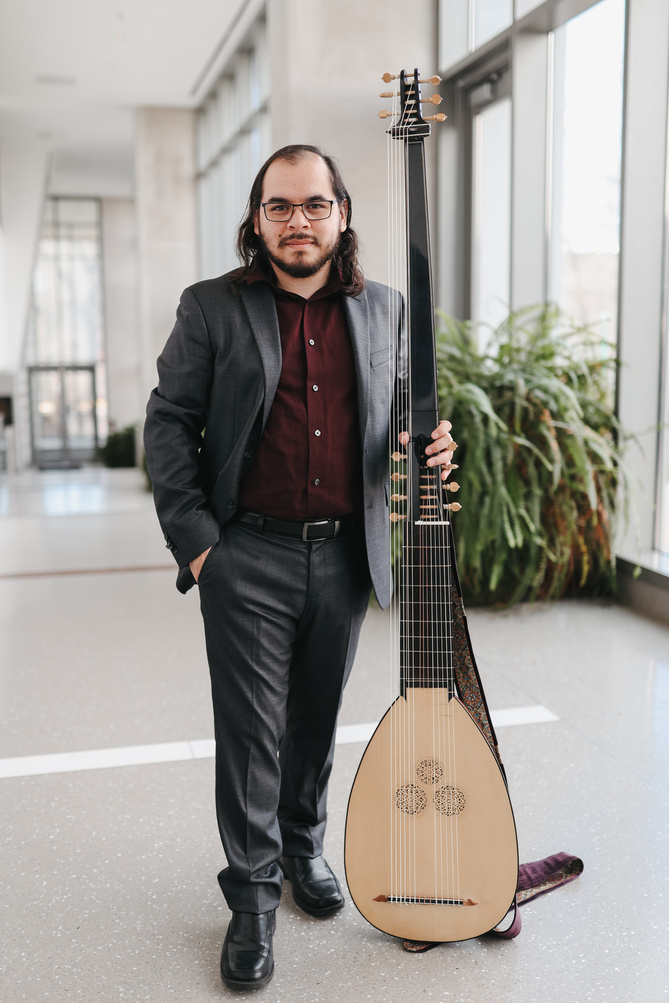

NICHOLAS PHAN, tenor and artistic director
Described by the Boston Globe as “one of the world’s most remarkable singers,” American tenor Nicholas Phan is increasingly recognized as an artist of distinction. With a diverse repertoire that spans nearly 500 years of music, he performs regularly with the world’s leading orchestras and opera companies. An avid recitalist and a passionate advocate for art song and vocal chamber music, in 2010 Nicholas co-founded Collaborative Arts Institute of Chicago, an organization devoted to promoting this underserved repertoire.
A celebrated recording artist, Nicholas’s recent albums, Stranger: Works for Tenor by Nico Muhly, Clairières, and Gods and Monsters, were nominated for the Grammy Award for Best Classical Solo Vocal Performance in 2022, 2020 and 2017, respectively. His nomination in 2017 made him the first singer of Asian descent to be nominated in the history of the category, which has been awarded by the Recording Academy since 1959.
Nicholas is sought after as a curator and programmer. In addition to his work as artistic director of CAIC, Nicholas is the host and creator of a web series examining the music of Johann Sebastian Bach, Bach 52, and he has created programs for broadcast on WFMT and WQXR. He has also served as guest curator for projects with the Philadelphia Chamber Music Society, Bravo! Vail Music Festival, San Francisco Opera Center, and San Francisco Performances, where he served as the vocal artist-in-residence from 2014 to 2018.
Nicholas’s programs often examine themes of identity, highlight unfairly underrepresented voices from history, and strive to underline the relevance of music from all periods to the currents of the present day.
CRAIG TROMPETER,
viola da gamba
Craig Trompeter is the founder and artistic director of Chicago’s acclaimed Haymarket Opera Company. As cellist and violist da gamba he has performed with Second City Musick, the Chicago Symphony Orchestra, Lyric Opera of Chicago, Chicago Opera Theater, Music of the Baroque, the Smithsonian Chamber Music Society, the Cincinnati Symphony Orchestra, and the Oberlin Consort of Viols. Additional performances have been heard at the Metropolitan Museum of Art, the Art Institute of Chicago, the Glimmerglass Festival, the Brooklyn Academy of Music, and the Valletta International Baroque Festival in Malta.
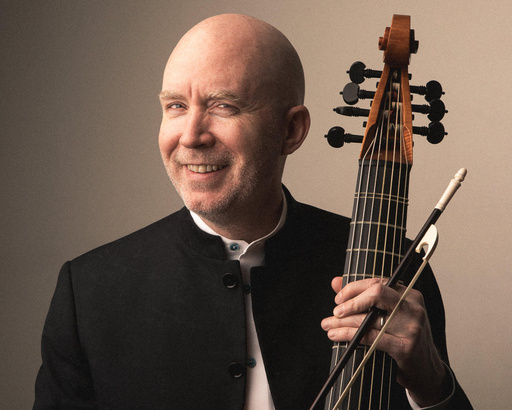
Craig has appeared as soloist at the Ravinia Festival, the annual conference of the American Bach Society, with the Chicago Symphony Orchestra, and with Music of the Baroque. He has recorded works of Mozart, Biber, Boismortier, Bologne, Marais, Vivaldi, Handel, Greene, Henry Eccles, and a potpourri of Elizabethan composers on the Harmonia Mundi, Cedille, and Centaur labels.
As a modern cellist, he was a founding member of the Fry Street String Quartet. He has taught master classes at the Cleveland Institute of Music, Oberlin, Grinnell College, and the Chicago Musical College. Trompeter conducts the Early Music Ensemble at the University of Chicago and teaches Baroque Performance Practices at Northwestern University.

SCHYLER VARGAS, baritone
Acclaimed as a “superb” (New York Stage Review) and “powerful baritone,”(Washington Post) Schyler Vargas is establishing himself as a versatile talent, bringing inter-disciplinary performances to the operatic, theatrical, and concert stage. Notable credits include highly praised performances at Carnegie Hall, first as Strephon in Iolanthe by Gilbert and Sullivan, then at Connie and the Ragged Man in The Grapes of Wrath by Ricky Ian Gordon, and premiering UNKNOWN by Shawn Okpebholo which was featured on PBS NewsHour and NPR.
Performing alongside some of opera and theatre greats such as Nathan Gunn, Christine Ebersole, and Kelsey Grammer, Schyler has been seen in main stage roles at The Atlanta Opera, The Glimmerglass Festival, Arizona Opera, Holy City Arts & Lyric Opera, Opera Theatre of Saint Louis, Lyric Opera of Kansas City, Pacific Opera Project, and the Chateau de Versailles in France.
Succeeding in both serious and comedic roles, past highlights include:
Eisenstein in Die Fledermaus, Papageno in Die Zauberflöte, Count Almaviva in Le nozze di Figaro, Cinderella’s Prince and the Wolf in Into the Woods, and Riff, Diesel, and Chino in West Side Story by with original Jerome Robbins choreography. On the concert stage, Schyler has been the baritone soloist for Vaughan William’s Five Mystical Songs, Orff’s Carmina Burana, Rossini’s Petite Messe Solenelle, and Schubert’s Mass No. 5 in A-flat.
Prioritizing new music in his career, Schyler has proudly worked on various commissions for new operas and song cycles with the Houston Grand Opera, Cincinnati Opera, The Glimmerglass Festival, Holy City Arts & Lyric Opera, UrbanArias, and Opera Theatre of Saint Louis.
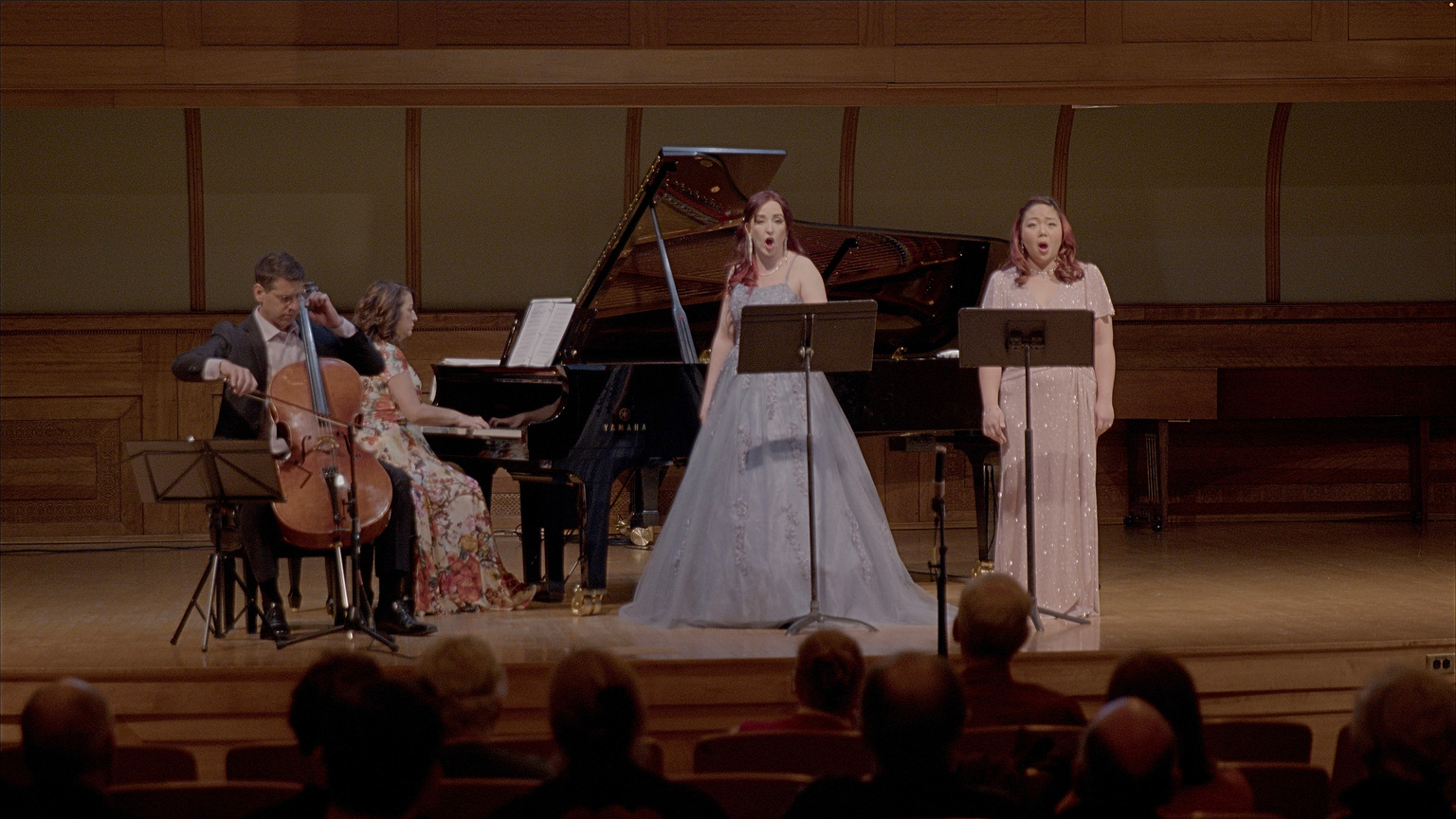
Soprano Corinne Costell, mezzo-soprano Michelle Mariposa,
cellist Michael Freilich and CAIC co-founder, pianist Shannon McGinnis
performing on our 2024 Spring Lieder Lounge
about caic
As founding partners of Collaborative Works, LLP, pianists Nicholas Hutchinson and Shannon McGinnis have been providing high quality affordable coaching and accompanying services in the Chicagoland area since 2006. In 2010 they joined forces with tenor Nicholas Phan to establish the Collaborative Arts Institute of Chicago with the goal of providing educational and performance opportunities for musicians, specifically through the promotion and advancement of art song and vocal chamber music repertoire.
Since its first event, a small, private house concert in 2010, CAIC’s educational and performance programs have expanded to include an annual series of public concerts and masterclasses, workshops, a multi-day festival, and a fellowship program for promising Chicago area singers and pianists. Opera News has described CAIC “as one of Windy City’s primary musical treasures”.
CAIC regularly partners with prominent arts organizations, universities and schools throughout Chicago. Praised by Chicago Classical Review for consistently producing “art song performances of the highest order”, its performances feature an international roster of singers, pianists, and instrumentalists who are leading performers of this repertoire world-wide. CAIC is the only arts organization in Chicago, and one of very few nationwide, to devote itself exclusively to art song, and reaches hundreds of Chicagoans each year with its performance and educational activities. The Chicago Tribune has written “the genre of art song singing will never lack a forum in the city’s musical life as long as the Collaborative Arts Institute of Chicago is there to affirm its importance and promote its growth."
STAFF
Eric Ferring, Executive Director
Nicholas Phan, Artistic Director
Shannon McGinnis, Director of Education
Justin Berkowitz, Director of Marketing and Operations
BOARD oF
DIRECTORS
Amy Conn Bloom
Michael Freilich
Shannon McGinnis
Nicholas Phan
Jonathon Thierer
Frank Villella
ADVISORY
BOARD
Jane Bunnell
Marc Embree
Amy Iwano
Martin Katz
Adolfo Laurenti
Lisa Ann Seischab
Louise K. Smith
All performance and master class photography by Mike Grittani and
Atlas Arts Media
SUpport CAIC
If you would like to support CAIC’s 2024-25 season projects and beyond, you can do so with a tax deductible donation at our website, or by scanning the QR code below:
In order to continue producing world-class performances of song and chamber music in intimate and exciting venues,
CAIC relies on the generosity of donors.
Collaborative Arts Institute of Chicago is a 501(c)3 organization.
Donations are tax deductible to the fullest extent allowable by law.
Thank you for your support!

GET INVOLVED
Want to further immerse yourself in the work of CAIC?
Interested in volunteering at an upcoming
CAIC performance?
Do you want to sponsor a performance or artist?
Are you interested in joining our Board of Directors?
We are always looking to add to our roster of incredible volunteers, and supporters of the work we do. If you’re interested in helping CAIC continue to thrive in the city of Chicago and beyond, and want to be part of our team, email us at:
collartschicago@gmail.com
OPEN
CALL
FOR
RECITAL PROPOSALS
Have a recital program you’ve put together, but have not found the right opportunity to present? Do you have a program you’ve performed before that you’re looking to mount again? Is there a project you’ve dreamed up with a collaborator or chamber ensemble that you are looking to bring to the stage?
From now until October 15, 2024, we invite you to send us these programs for consideration in an upcoming season.
Proposals should be fully realized programs (approximately 60-70 minutes in length) that center art song in fresh, exciting ways. Your project can explore a composer, theme, language - choose whatever songs or vocal chamber pieces speak to you as an artist.
SEND YOUR PROJECT SUBMISSION AND A RESUME TO
collartschicago@gmail.com
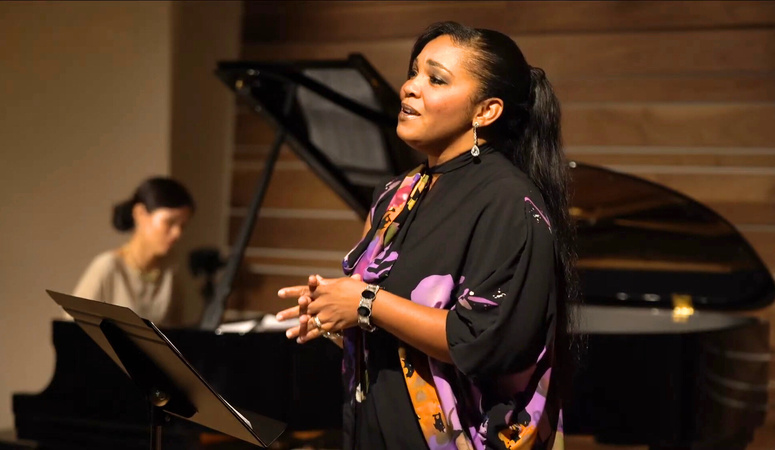
Soprano Janai Brugger and pianist Myra Huang
during the 2020 Collaborative Works Festival
2024-25 LIEDER LOUNGES
FALL LIEDER LOUNGE


OCTOBER 29 | 7:30 PM
Join CAIC-favorites soprano Laquita Mitchell and pianist Craig Terry for an evening celebrating the songs of Giacomo Puccini.
WINTERLIEDER LOUNGE


FEBRUARY 27 | 7:30 PM
We welcome Grammy award-winning tenor Karim Sulayman and pianist Shannon McGinnis for an evening of French song.
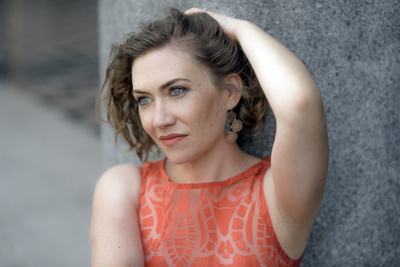
SPRINGLIEDER LOUNGE

APRIL 23 | 7:30 PM
Internationally-acclaimed soprano Heidi Stober and pianist Tanya Blaich join us for a program of Barber, Strauss and more.
CAIC IS GRATEFUL TO THE FOLLOWING INDIVIDUALS & ORGANIZATIONS
FOR THEIR VALUABLE SUPPORT
OF THE 2024 | 25 SEASON
LISTING AS OF 8.25.24
BENEFACTORS ($5,000 and up)
Bettina Baruch Foundation • Chicago Department of
Cultural Affairs and Special Events • Sasha Gerritson and
Eugene Jarvis • Julian Family Foundation
Franci Neely Foundation • Sem & Katherine Phan
Paul M. Angell Family Foundation• Thierer Family Foundation Cathy C. Williams
FRIENDS ($1,000-4,999)
Anonymous (2) • Thomas Bulgrin (in memory of Deborah Bulgrin) John Concepción • Amy Conn Bloom and Bruce Bloom
Nancy Dehmlow • Kent Dymak and Theodore Foss
Eric Ferring and Dr. Jacob Miller
Dr. Robert and Judith Freilich • Michael Freilich and Shannon McGinnis • Illinois Arts Council Agency • Loretta Julian
John and Jean Nitschke • Michael and Margo Oberman
Nicholas Phan • Gerry and Steve Ricci • Noah Sochet • Peggie Telscher and Tom Snopek • Cynthia Vahlkamp and Robert Kenyon Frank Villella • Howard White
SUSTAINERS ($500-999)
De Priest Family Foundation • Martin Katz • Maria and Peter Lagios • Tianju Liu • Patricia and Alan Miller • John H. Nelson
North Shore Congregational Israel
Terri and Bob Ryan • Yvonne So • Louella Ward
ASSOCIATES ($250-499)
Richard Abram • Charles Amenta III • Fotine Assimos
Paul Chandler • Marc Embree and Jane Bunnell
Brent Funderburk • Janet Funderburk • Ronny Michael Greenberg Allen and Gail Juris • Masahiro Kasai • Susan Noel
Joseph Perlman Family Foundation
Roger Pines and Tony Amberg • Lisa Seischab
Ellen and Lewis Smith • Jonathon Thierer
PATRONS ($100-249)
Andrea Benn • Jesse Blumberg
Mike Boylan and Andrew Wingersky • Barbara Breakstone
Perri Courtheoux • Jeanne LaDuke • Carol and Leon Dragon Catherine Goodman • Aaron Gottl
CAIC IS GRATEFUL TO THE FOLLOWING INDIVIDUALS & ORGANIZATIONS
FOR THEIR VALUABLE SUPPORT
OF THE 2024 | 25 SEASON
PATRONS ($100-249)
Aimee Graham and Nigel Caine • Ray Hardin • Amy Iwano
Jewish Community Foundation/Milwaukee Jewish Federation
Lisa Kurtzon • John Laurenzo • Jacqueline Melega
Ann Metcalfe • Rob and Janie Sills
CONTRIBUTORS ($25-99)
Nelson Armour • Stuart Bard • Phillip Braun • Evan Bravos
Justin Berkowitz • Elizabeth Buchieri • Laurie Ferring
Mary Ferring Weis • Robert Fields
Leanne Freeman-Miller and Gordon Miller Jerry Fuller • Juliana Hall • Andrea Jones
Ellen McGrew • Clara Osowski• Johnathon Pape
Laura Perkett • Sean Michael Plumb • Karen Reddick
Bobbie Rudnick Megan Schumacher • Natalie Sherer Meaghan Smallwood Evan Snyder• Kim Swift
CAIC'S 2024 | 25 SEASON PROGRAMMING IS MADE
POSSIBLE IN PART THANKS TO GENEROUS SUPPORT
FROM THE FOLLOWING ORGANIZATIONS





COLLABORATIVE ARTS INSTITUTE OF CHICAGO